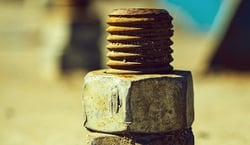
During a construction project, a wise builder knows that we don’t only look at the building materials we’re using, but also the environment of where they will be used. Our materials will react and be altered by fluctuations in temperature, stability, moisture and other outside factors. One interaction in particular can be the bane of any coastal builder, and that’s the interaction of salt and metals. Salty air and moisture cause metal to corrode and slowly deteriorate. As a result, metal fasteners on buildings in coastal areas can lose their structural integrity from exposure to ocean air. The combination of oxygen, salt, and sodium chloride eats away at the metal, as airborne bacteria from the ocean also consume the iron and cause it to rust.
The impact of the salty air on metal material is so extensive that it can affect structures up to 50 miles inland. Therefore, if you have a building that is just off the coast, you may face structural problems faster than expected.
Factors That Impact Corrosion in Metal
The Type of Metal You Use
Building projects often call for a wide range of metals – silver, steel, zinc, iron, copper, or aluminum. You may also choose from different grades of metal or metal composites. Although stainless steel, aluminum, copper, and galvanized steel have corrosion-resistant properties, they still react to salty air and oxygen.
Salty Air Mixed with Pollution
When salty air mixes with pollution, it can speed up corrosion rates in various types of metal fasteners. Pollution levels are higher in marine, industrial, and urban areas. These areas contain pollutants such as auto emissions, sulfur, waste, nitrogen oxides, heating fuels, and other substances.
Major metropolitan areas can also produce a combination of pollutants at high levels. When mixed with the salty air, pollutants have a caustic effect on metal, causing more damage to a building’s structure.
Oxygen
The oxygen in salty air plays a big role in metal corrosion. When the metal reacts with oxygen, it causes oxidation. The atoms in the metal lose their electrons to the oxygen atoms. This alters the state of the metal. You may notice when oxidation occurs by the discoloration of the metal. Rust will turn red, but some metals may also become green or blue.
How to Reduce the Effects of Salty Air
Although it may be impossible to prevent rust and corrosion on metal completely, you can take measures to reduce the impact of the salty air on metal structures. Some tips include:
· Use galvanized fasteners that do not corrode. Steel fasteners have a special coating that protects them from the salty air. Therefore, they are likely to last longer without rusting.
· Use a specialized metal finish that is designed for coastal areas with high levels of salty air. A simple layer of coating can preserve the integrity of your structure.
Salty air is destructive. However, you can protect the building or structure from corrosion by using the right materials that protect them with the right type of sealant.
To protect against corrosion in coastal areas, consider using stainless steel fasteners. Stainless steel is the most corrosion-resistant metal available, and the grade you use will be dependent upon the exposure your structure will have to the environment. Also, avoid joining stainless with dissimilar metals, especially those with high galvanic potential, because it promotes corrosion.
For general construction, using fasteners with a corrosion-resistant finish like FasCoat® is a good practice to prevent rust in normal conditions. Developed by the BECK Group, fasteners covered in FasCoat® are proven to withstand up to 2,000+ hours in salt spray testing before first signs of red rust. Whenever you are planning a new project, be sure to consider not only the materials you will use, but where you will use them, to ensure your work lasts.
.svg.png)

